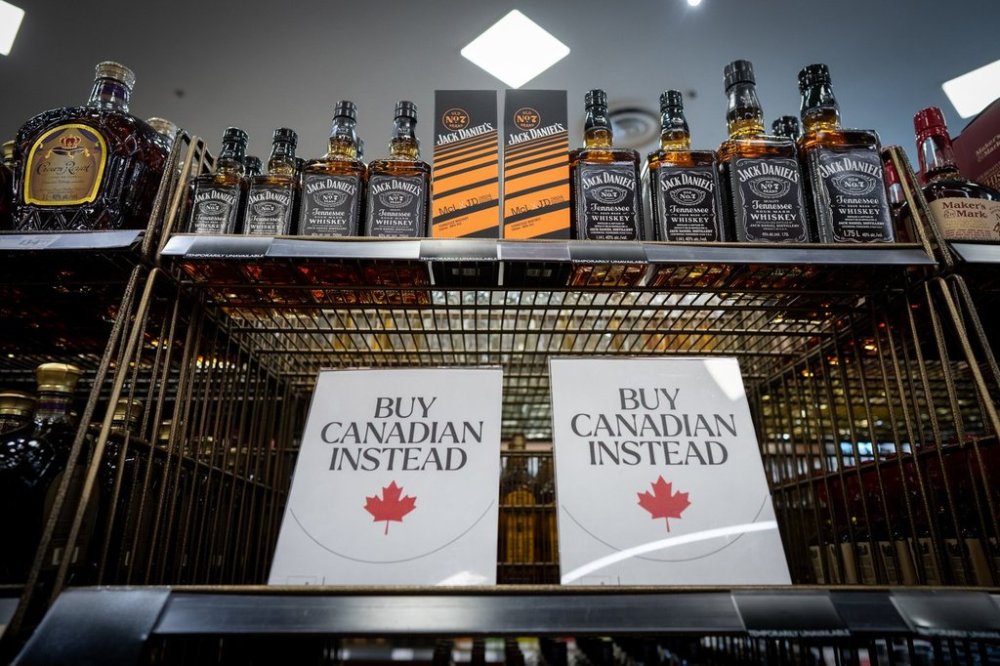N.B. wants to sell its stock of American alcohol removed in anti-Trump protest
Advertisement
Read this article for free:
or
Already have an account? Log in here »
To continue reading, please subscribe:
Monthly Digital Subscription
$0 for the first 4 weeks*
- Enjoy unlimited reading on winnipegfreepress.com
- Read the E-Edition, our digital replica newspaper
- Access News Break, our award-winning app
- Play interactive puzzles
*No charge for 4 weeks then price increases to the regular rate of $19.00 plus GST every four weeks. Offer available to new and qualified returning subscribers only. Cancel any time.
Monthly Digital Subscription
$4.75/week*
- Enjoy unlimited reading on winnipegfreepress.com
- Read the E-Edition, our digital replica newspaper
- Access News Break, our award-winning app
- Play interactive puzzles
*Billed as $19 plus GST every four weeks. Cancel any time.
To continue reading, please subscribe:
Add Free Press access to your Brandon Sun subscription for only an additional
$1 for the first 4 weeks*
*Your next subscription payment will increase by $1.00 and you will be charged $16.99 plus GST for four weeks. After four weeks, your payment will increase to $23.99 plus GST every four weeks.
Read unlimited articles for free today:
or
Already have an account? Log in here »
FREDERICTON – The New Brunswick Liquor Corporation says it wants to sell the remaining $3.4 million worth of American alcohol it removed from store shelves in protest over the policies of U.S. President Donald Trump.
Lori Stickles, corporation president, told a legislature committee earlier in the week that the agency has sold about $600,000 worth of American alcohol since the protest began in March.
The corporation, along with liquor boards across the country, removed American alcohol from shelves after Trump started to threaten Canada with a trade war and annexation.

There is not much demand for American products with consumers having moved on, she said.
An October report from the Distilled Spirits Council of the United States said American booze exports to Canada dropped by 85 per cent in the second quarter compared with the same period the year earlier, plunging below US$10 million.
“A lot of (restaurants and bars) reprinted menus. They’ve redone how they make their drinks,” she said.
“And so the question is, what happens to these products?”
Customers can purchase the American booze at the corporation’s depot in Salisbury, N.B., she said. Bottles can also still be found at some government-run liquor stores, she added.
“We own these products. Let’s sell them,” Stickles said. “So we’re actively working to recover that investment for the people of New Brunswick. We don’t want to be storing these products or, you know, in the event some of them get too old, then you have to destroy the product.”
In August, the Quebec liquor board said it may be forced to destroy $300,000 worth of American alcohol that the province had banned from stores.
In New Brunswick, Premier Susan Holt had said the province typically sells about $40 million worth of American alcohol products in stores each year.
“I have directed NB Liquor to cease purchasing U.S. alcohol and to remove their products from the shelves,” she said in February.
But in May, Progressive Conservative legislative assembly member Kathy Bockus asked in question period why the province doesn’t just sell the American liquor.
Luke Randall, minister responsible for New Brunswick Liquor, replied that some American alcohol was available at the agency’s stores but also noted the increase in shelf space for Canadian products.
Stickles said about 14 per cent of the shelf space is dedicated to local products, which make up eight per cent of the agency’s sales. She did not give the numbers for Canadian products and alcohol from other countries.
“There’s a lot of local presence,” she said. “Certainly recently, the sentiment toward local is greater than ever. We saw that sentiment during COVID and we’ve certainly seen a surge of that sentiment, again, with the recent things that are happening geopolitically.”
This report by The Canadian Press was first published Oct. 11, 2025.

